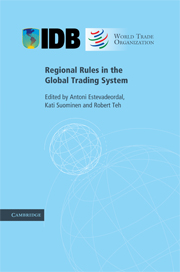Book contents
- Frontmatter
- Contents
- List of figures
- List of tables
- List of Contributors
- Foreword
- Acknowledgements
- List of abbreviations
- 1 Introduction
- 2 Big-Think Regionalism: a critical survey
- 3 Market access provisions in regional trade agreements
- 4 Trade remedy provisions in regional trade agreements
- 5 A mapping of regional rules on technical barriers to trade
- 6 Services liberalization in the new generation of preferential trade agreements: how much further than the GATS?
- 7 Mapping investment provisions in regional trade agreements: towards an international investment regime?
- 8 Competition provisions in regional trade agreements
- Appendix: List of RTAs included in the survey
- Index
2 - Big-Think Regionalism: a critical survey
Published online by Cambridge University Press: 01 March 2011
- Frontmatter
- Contents
- List of figures
- List of tables
- List of Contributors
- Foreword
- Acknowledgements
- List of abbreviations
- 1 Introduction
- 2 Big-Think Regionalism: a critical survey
- 3 Market access provisions in regional trade agreements
- 4 Trade remedy provisions in regional trade agreements
- 5 A mapping of regional rules on technical barriers to trade
- 6 Services liberalization in the new generation of preferential trade agreements: how much further than the GATS?
- 7 Mapping investment provisions in regional trade agreements: towards an international investment regime?
- 8 Competition provisions in regional trade agreements
- Appendix: List of RTAs included in the survey
- Index
Summary
Introduction
In the late 1940s and 1950s, the profession's best and brightest minds were focused on regionalism: Jacob Viner, James Meade, Richard Lipsey, Harry Johnson and Max Cordon, inter alia. The reason was simple. Europe's post-war architecture was one of the world's greatest problems and a free trade area was to be part of it, economists were muddled over the issue. The thinking of the 1950s straightened out the economics and established the intellectual paradigm that dominated the regionalism literature right up to 1991. The paradigm was framed around the Vinerian question: ‘Would a nation gain from joining various preferential trade configurations?’, This literature – what could be called Small-Think Regionalism – ignored systemic implications since the only large preferential arrangement – the EEC – was viewed as sui generis.
All this changed in the late 1980s when large-scale regionalism was reignited in North America. Regionalism seemed to sweep the world trading system like wildfire while the multilateral GATT talks proceed at a glacial pace. Then GATT negotiations slipped into a four-year coma in December 1990 with the acrimonious failure of the summit that was supposed to have wrapped up the Uruguay Round. Regionalism seemed to threaten the multilateral trade system. Once again, regionalism attracted attention from the profession's leading lights.
In 1991, Paul Krugman, Larry Summers and Jagdish Bhagwati laid out lines of analysis – what might be called Big-Think Regionalism – that continue to guide the profession's thinking on regionalism even today.
- Type
- Chapter
- Information
- Regional Rules in the Global Trading System , pp. 17 - 95Publisher: Cambridge University PressPrint publication year: 2009
- 1
- Cited by



